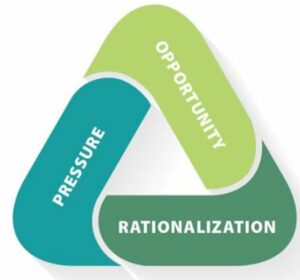
Fraud is a crime that is becoming more common in the workplace. It can be committed by anyone in your company, from the newest employee to those with the most experience.
The Fraud Triangle
To effectively combat fraud, you must understand what factors are conducive to fraud in the workplace. The most common model to explain fraud is called the Fraud Triangle. The Fraud Triangle outlines three components that are typically always present when an individual commits fraud: (1) the employee perceives that there is opportunity; (2) the employee has a motive (pressure), or a reason to commit fraud; and (3) the employee can rationalize why committing the fraud is acceptable.

Fortunately, there are a few easy things you can do to prevent fraud from happening in your company. Each of the prevention measures we discuss below seeks to eliminate one or more of the Fraud Triangle factors. For example, internal controls seek to eliminate the opportunity to commit fraud, while establishing a culture of honesty seeks to remove employees’ ability to rationalize stealing from the workplace.
Establish Good Internal Controls
Business owners need to implement policies, authorizations, and procedures that ensure financial reporting is accurate and conducted in an efficient manner. These mechanisms and policies are known as “internal controls.” By establishing good internal controls, you will ensure that your business assets and data are protected against theft or misuse.
While internal controls may look different for every business, there are a few common ones you may want to integrate into your company:
- Physical Controls – Physical controls protect a company’s tangible assets. Some examples might be having a secure area where a company can store their high-value assets when not in use or maintaining the computer server in a locked room.
- Segregation of Duties – Segregation of duties ensures that no single employee has control over all aspects of a transaction. For example, responsibilities for collecting cash, recording transactions, depositing cash receipts, and reconciling books should be assigned to different individuals instead of allowing one employee to handle all tasks. Segregating tasks reduces the possibility that one person can both steal from the company and cover their tracks.
- Information Processing Controls – When numbers or data are processed, there should be a set of checks performed to ensure they are complete and accurate. Information processing controls can be performed digitally or manually.
- Reconciliations – Checking your company’s records against external records like bank statements and loan balances can help ensure the company’s financial records are accurate. To be most effective, these reconciliations should be performed monthly or quarterly. Reconciliations should be performed or reviewed by someone who did not record the transactions.
READ MORE: Don’t Neglect Internal Controls for Remote Work
Create a Culture of Honesty
Employees should feel comfortable coming forward when something doesn’t seem right. The best way to do this is by creating a culture of honesty in the workplace so that everyone feels comfortable bringing their concerns to the table. Get members of management on board so they can communicate company goals, reward honesty, and – most importantly – so they can model the desired behavior.
Screen Employees for Competency and Honesty
Screening employees for competency is a no-brainer, but many employers overlook the importance of screening them for honesty. This can be done by checking references and conducting background checks as well as reviewing their social media profiles to see if there are any red flags that could indicate dishonesty or fraudulent behavior in the workplace.
Develop a Fraud Policy
Set clear boundaries for employee conduct by developing a fraud policy. In addition, discuss with employees the role they play in protecting the company’s assets and explain why fraud and internal control policies are vital to the company so that they can see the usefulness of the policies.
Train Your Employees
Provide your employees with training and education around fraud, including how to identify the warning signs of fraud, how to report fraud if they see it or suspect it, and how they can prevent it.
Require an Annual Audit
Auditors gain an understanding of the internal controls relevant to the fair presentation of the financial statements that are being audited. While doing this, the auditors can identify potential vulnerabilities in the company’s internal control policies. If your auditors are especially helpful, they might even give you suggestions on how to address these vulnerabilities.
Regularly Check Bank Account Statements
Since most institutions offer online banking, it’s easy to view statements and account activity whenever needed. It is imperative that business owners monitor bank activity regularly to check for unknown payments, missing checks, or questionable transactions with vendors. If you notice anything suspicious, report it immediately so the issue can be addressed before the problem escalates.
What To Do If Fraud Occurs in The Workplace
If you believe fraud has occurred, know who your support system is.
- The Police. Depending on the damages, the fraud might need to be reported and investigated.
- Your Insurance Company. If you established the correct type of insurance, your insurance company may reimburse you for the losses you sustained.
- Your Lawyer. If the person who committed fraud was an employee or contractor, you may have grounds for a lawsuit against them.
- Your Accountant. Your accountant should be able to help you identify how the fraud occurred, suggest new policies or procedures that could prevent this type of fraud from occurring in the future and evaluate the damage done. They may also be able to set you up on a regular schedule for reviews of high-risk systems to ensure your internal controls are working as they should be.
Get Ahead of Fraud in The Workplace
You might be thinking, “What’s the point of implementing methods to deter theft if I work in a safe environment?” But fraud can happen anywhere and can be perpetrated by anyone, even in companies with a close-knit staff. We have seen instances of fraud with our clients, and we can tell you firsthand that preventing fraud is much easier (and cheaper!) than cleaning up afterward.
Consider implementing one or more of the tips we’ve listed above to help you, and if you believe fraud has occurred, call us to inquire about how our forensic accounting professionals can help.